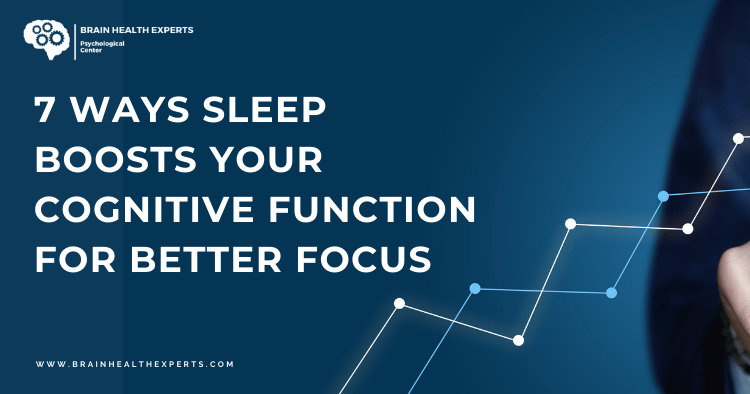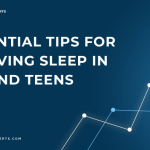Table of Contents
- Introduction
- 1. Improved Memory Retention
- 2. Enhanced Problem-Solving Skills
- 3. Increased Creativity
- 4. Better Decision-Making
- 5. Enhanced Concentration
- 6. Emotional Stability
- 7. Protection Against Cognitive Decline
- Conclusion
- FAQs
Introduction
Sleep is often overlooked in our fast-paced lives, but it plays a critical role in our cognitive function. Whether you’re a student trying to ace your exams, a professional striving for peak performance, or simply someone looking to improve day-to-day focus, understanding how sleep influences your cognitive abilities is vital. In this article, we’ll explore seven ways sleep boosts cognitive function, empowering you to harness the power of rest for better focus.
1. Improved Memory Retention
Sleep is essential for memory consolidation—the process of transferring information from short-term to long-term memory. During sleep, particularly in the REM (rapid eye movement) stage, your brain organizes and stores new information, making it easier to recall later.
“Sleep is the best meditation.” – Dalai Lama
Key Points:
- Stages of Sleep: The sleep cycle consists of several stages, each playing a role in memory consolidation.
- Research Findings: A study published in Nature Neuroscience found that participants who had a full night’s sleep were better at recalling information than those who were sleep-deprived.
By ensuring you get enough quality sleep, you can significantly enhance your ability to retain information. For more on the transformative effects of positive thinking on daily life, check out 10 Ways Positive Thinking Transforms Your Daily Life.
2. Enhanced Problem-Solving Skills
Have you ever had a breakthrough on a problem after a good night’s sleep? This phenomenon is backed by science. Sleep facilitates creative problem-solving by allowing your brain to make new connections.
“Creativity is intelligence having fun.” – Albert Einstein
Key Points:
- Incubation Effect: Taking a break and allowing your brain to rest can lead to innovative solutions.
- Studies Support This: Research in the journal Cognitive Psychology shows that individuals who sleep after learning a task perform better than those who remain awake.
Incorporating naps or ensuring a full night’s sleep can unlock your brain’s potential to tackle complex problems with fresh perspectives. To enhance your mindset further, refer to 10 Powerful Techniques to Cultivate a Positive Mindset.
3. Increased Creativity
Sleep isn’t just about rest; it’s also a time for creativity to flourish. During sleep, especially during REM cycles, the brain synthesizes and reorganizes information, leading to enhanced creative thinking.
“Sleep is like a time machine to the future.” – David Eagleman
Key Points:
- Dreams and Creativity: Dreams can provide a unique blend of experiences and emotions that can inspire creative ideas.
- Research Insights: A study in the journal Sleep indicated that well-rested individuals generate more creative solutions than their tired counterparts.
To foster your creativity, make sleep a priority. By doing so, you give your brain the time it needs to innovate and create. For more strategies to boost mental health and creativity, see 10 Positive Thinking Exercises to Boost Mental Health.
4. Better Decision-Making
Quality sleep has a profound impact on your decision-making abilities. Lack of sleep can lead to impaired judgment and increased risk-taking, as the brain struggles to process information effectively.
“Your future depends on your dreams, so go to sleep.” – Unknown
Key Points:
- Cognitive Load: Sleep deprivation increases cognitive load, making tasks feel harder and decisions foggy.
- Scientific Evidence: Research published in Sleep Medicine Reviews emphasizes that participants who were well-rested made more rational choices.
Prioritizing sleep can sharpen your decision-making skills, helping you make choices that are more informed and beneficial. For tips on overcoming negative thought patterns, check out 10 Tips to Overcome Negative Thought Patterns Today.
5. Enhanced Concentration
One of the most immediate benefits of a good night’s sleep is improved concentration. Sleep revitalizes your brain, enabling you to focus better on tasks and absorb information more efficiently.
“Concentration is the secret of strength.” – Ralph Waldo Emerson
Key Points:
- Attention Span: Sleep deprivation can lead to a shorter attention span and distractibility.
- Research Findings: The Journal of Clinical Sleep Medicine shows a direct correlation between sleep quality and concentration levels.
To maintain your focus throughout the day, aim for 7-9 hours of quality sleep each night. For more insights on boosting mental health, see 10 Proven Stress Management Techniques for Daily Relief.
6. Emotional Stability
Sleep plays a crucial role in emotional regulation. Poor sleep can heighten emotional responses and lead to mood swings, which can hinder cognitive function and focus.
“Sleep is the golden chain that ties health and our bodies together.” – Thomas Dekker
Key Points:
- Stress and Sleep: Lack of sleep can increase stress levels, making it harder to concentrate and think clearly.
- Research Evidence: Findings from Psychological Bulletin indicate that people with regular sleep patterns report lower levels of anxiety and depression.
By getting enough rest, you not only improve cognitive function but also foster emotional resilience. For more on emotional well-being, consider reading 10 Ways Positive Thinking Boosts Emotional Well-Being.
7. Protection Against Cognitive Decline
Chronic sleep deprivation can lead to long-term cognitive decline and conditions such as Alzheimer’s disease. Quality sleep helps maintain brain health and function as you age.
“Sleep is the best medicine for the mind.” – Unknown
Key Points:
- Brain Maintenance: Sleep aids in clearing out toxins that accumulate in the brain during waking hours.
- Studies Show: Research in Neurology suggests that individuals who sleep poorly are at a higher risk for cognitive decline.
By prioritizing sleep, you’re investing in your long-term cognitive health and preventing future mental decline. For more on building resilience and its impact on cognitive function, see 10 Effective Strategies for Building Resilience in Mental Health.
Conclusion
Sleep is not just a time for rest; it is an essential component of cognitive function. By understanding the various ways sleep enhances your mental capabilities, you can make informed choices that promote better focus, creativity, and decision-making. So, the next time you consider sacrificing your sleep for productivity, remember the incredible benefits that a good night’s rest can provide.
FAQs
Q: How much sleep do I need for optimal cognitive function?
A: Most adults require 7-9 hours of quality sleep each night for optimal cognitive function.
Q: Can naps improve cognitive performance?
A: Yes! Short naps (20-30 minutes) can boost alertness and cognitive performance without causing sleep inertia.
Q: What can I do to improve my sleep quality?
A: Establishing a consistent sleep schedule, creating a relaxing bedtime routine, and limiting screen time before bed can all enhance sleep quality.
Q: Are there any foods that help promote better sleep?
A: Foods rich in magnesium (like nuts and leafy greens), melatonin (like cherries), and complex carbohydrates can help promote better sleep.
For more in-depth insights on sleep and cognitive function, check out resources from the National Sleep Foundation here.
By making sleep a priority, you can unlock your brain’s full potential for better focus and cognitive performance. Sweet dreams!





